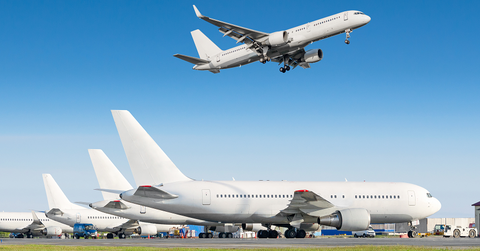Boeing MAX: EU Regulator Thinks It Will Fly Again in Q1
The EASA (European Union Aviation Safety Agency) expects Boeing’s (BA) grounded 737 MAX aircraft to fly again in the first quarter of 2020.
Nov. 5 2019, Updated 11:10 a.m. ET

The EASA (European Union Aviation Safety Agency) expects Boeing’s (BA) grounded 737 MAX aircraft to fly again in the first quarter of 2020. According to Reuters, the EASA’s executive director, Patrick Ky, said on Monday that the agency might give approval in January. However, he cautioned that individual EU nations and airline operators might take more time to resume services.
According to Ky’s assumptions, the whole process could delay Boeing MAX’s return to skies by two months. He expects that the MAX will return to the skies by the end of the first quarter despite receiving approval from the EASA in January.
Ky’s comment came during the EASA’s annual safety conference in Helsinki, Finland. During the meeting, he said, “If there are training requirements (and) coordination to be done with the EU member states to make sure everyone does the same thing at the same time, this will take a bit of time. That’s why I’m saying the first quarter of 2020.”
Boeing MAX might return in phases
The Boeing 737 MAX aircraft has faced a global flying ban since mid-March following two fatal accidents within five months. Investigators found that software glitches in MAX’s MCAS (Maneuvering Characteristics Augmentation System) caused the two accidents.
Boeing is working with world regulators to fix the problem. The company is redesigning the MCAS system, which will now draw operational data from two sensors. Notably, for decades, Boeing designed its 737 series planes to receive operational data from only one of the sensors.
The problems with Boeing MAX’s MCAS system highlighted serious FAA faults during the certification process. The US Office of Special Counsel’s probe found that the FAA’s MAX safety inspectors weren’t qualified. The agency also faces criticism for delegating MAX’s essential technical evaluations to Boeing.
As a result, several global regulators are conducting an independent review of 737 MAX safety, which is in contrast to the traditional approach. Traditionally, the FAA has always certified Boeing’s aircraft. Other regulators relied on the FAA according to Reuters.
Therefore, discrepancies among regulators are delaying the re-certification process for Boeing MAX aircraft. In September, Boeing CEO Dennis Muilenburg cautioned that the 737 MAX might return to the skies in phases due to disparity among regulators. In the US, he hopes to receive safety approval by the end of 2019.
MAX crisis hurts Boeing financials
The 737 MAX fiasco impacts Boeing’s financials. MAX accounts for nearly 70% of Boeing’s overall aircraft shipments and contributes approximately 30% to the total operating profit. The company’s aircraft deliveries fell 67% in the third quarter due to the grounding. As a result, Boeing’s third-quarter revenues and EPS fell 21% and 59%, respectively.
During the latest quarterly results, Boeing revealed that the overall costs associated with the MAX crisis reached $9.2 billion. Among the total, $3.6 billion is related to increased production costs due to reduced output. In April, the company reduced MAX’s monthly production 19% to 42 units.
Also, Boeing recorded the remaining $5.6 billion as a pre-tax charge associated with an estimated compensation cost to MAX customers. About 370 Boeing MAX planes are grounded globally. In the US, Southwest Airlines (LUV), American Airlines (AAL), and United Airlines (UAL) own 72 Boeing MAX aircraft combined. The three companies have faced more than 50,000 flight cancelations since mid-March.
The massive flight cancelations have a negative impact on the companies’ financials. In the second and third quarters, flight cancelations reduced Southwest Airlines’ pre-tax income by a cumulative $385 million. American Airlines’ pre-tax income faced a negative impact of $315 million in the last two quarters.
Stock performance
Boeing stock gained 1.7% on Monday due to hopes of MAX returning to service in the first quarter of 2020. The shares had been under pressure since the Ethiopian Airlines crash on March 10. Boeing stock has fallen 17% since the mishap.
Notably, the stock was the top performers among the Dow Jones 30 components as of March 8 with a YTD (year-to-date) gain of 31%. However, its YTD gain has eroded to 9%. Now, Boeing is in 20th place among the Dow Jones 30 component stocks.
